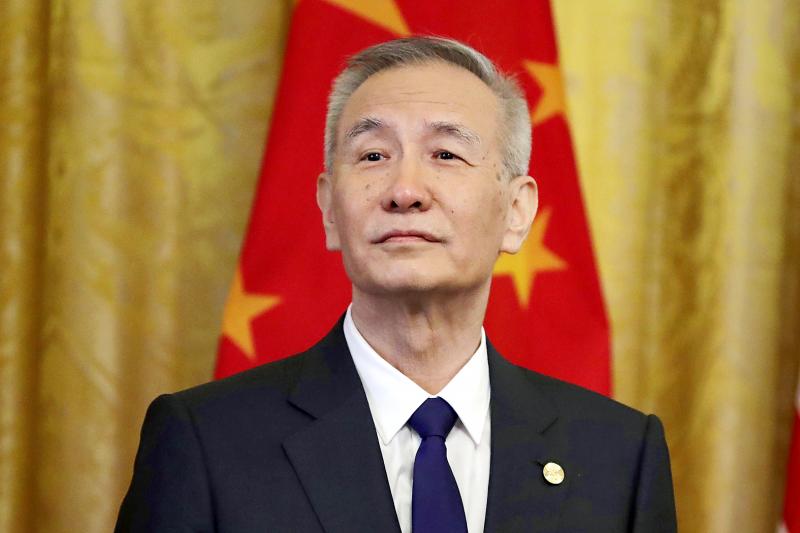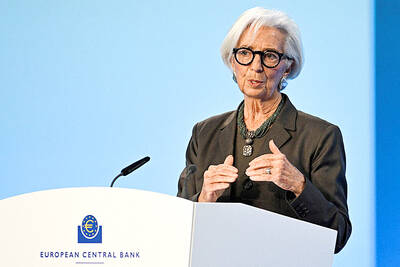China and the US on Saturday held a virtual meeting regarding the two countries’ fraught trade relationship, after a lengthy break in negotiations.
Beijing’s top trade negotiator, Chinese Vice Premier Liu He (劉鶴), called US Trade Representative Katherine Tai (戴琪) to discuss a phase 1 trade deal, negotiated under former US president Donald Trump’s administration, along with other major economic concerns, the Chinese Ministry of Commerce said in a statement.
Both sides “conducted pragmatic, candid and constructive exchanges,” the statement said.

Photo: AP
Tai last week said that she planned frank conversations with officials in Beijing about an interim trade deal aimed at resolving a tariff war.
Liu also pushed for the cancelation of additional tariffs and sanctions levied by the US on Chinese goods.
The phase 1 trade deal put on pause a trade dispute enacted by Trump, who raised tariffs on Chinese imports over complaints about Beijing’s industrial policy and trade surplus. China retaliated by suspending purchases of US soybeans and raising tariffs on other goods.
Under US President Joe Biden, the US has maintained the higher tariffs and other policies that have elicited complaints from Beijing, but has sought a more cordial tone in bilateral discussions.
Liu also explained his country’s position on its economic development model and industrial policies.
China’s economy has bounced back relatively quickly following the COVID-19 pandemic, but has run into headwinds from large amounts of corporate and local government debt, as well as restrictions on high-tech exports, particularly those enacted by the US.

European Central Bank (ECB) President Christine Lagarde is expected to step down from her role before her eight-year term ends in October next year, the Financial Times reported. Lagarde wants to leave before the French presidential election in April next year, which would allow French President Emmanuel Macron and German Chancellor Friedrich Merz to find her replacement together, the report said, citing an unidentified person familiar with her thoughts on the matter. It is not clear yet when she might exit, the report said. “President Lagarde is totally focused on her mission and has not taken any decision regarding the end of

French President Emmanuel Macron told a global artificial intelligence (AI) summit in India yesterday he was determined to ensure safe oversight of the fast-evolving technology. The EU has led the way for global regulation with its Artificial Intelligence Act, which was adopted in 2024 and is coming into force in phases. “We are determined to continue to shape the rules of the game... with our allies such as India,” Macron said in New Delhi. “Europe is not blindly focused on regulation — Europe is a space for innovation and investment, but it is a safe space.” The AI Impact Summit is the fourth

CONFUSION: Taiwan, Japan and other big exporters are cautiously monitoring the situation, while analysts said more Trump responses ate likely after his loss in court US trading partners in Asia started weighing fresh uncertainties yesterday after President Donald Trump vowed to impose a new tariff on imports, hours after the Supreme Court struck down many of the sweeping levies he used to launch a global trade war. The court’s ruling invalidated a number of tariffs that the Trump administration had imposed on Asian export powerhouses from China and South Korea to Japan and Taiwan, the world’s largest chip maker and a key player in tech supply chains. Within hours, Trump said he would impose a new 10 percent duty on US imports from all countries starting on

STRATEGIC ALLIANCE: The initiative is aimed at protecting semiconductor supply chain resilience to reduce dependence on China-dominated manufacturing hubs India yesterday joined a US-led initiative to strengthen technology cooperation among strategic allies in a move that underscores the nations’ warming ties after a brief strain over New Delhi’s unabated purchase of discounted Russian oil. The decision aligns India closely with Washington’s efforts to build secure supply chains for semiconductors, advanced manufacturing and critical technologies at a time when geopolitical competition with China is intensifying. It also signals a reset in relations following friction over energy trade and tariffs. Nations that have joined the Pax Silica framework include Japan, South Korea, the UK and Israel. “Pax Silica will be a group of nations